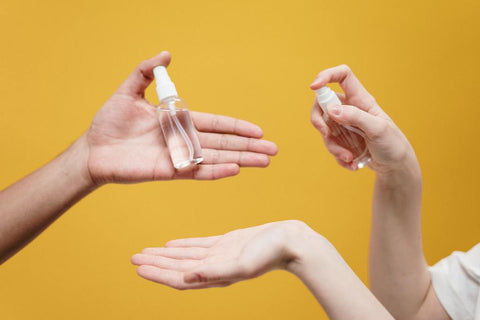How effective are hand sanitizers during the pandemic?
How effective are hand sanitizers during the pandemic?
In recent times, many cannot leave the home without a compact bottle of hand sanitizer; this is a good eventuality as good hand hygiene is one of our best protections against getting ill. According to Jeanne Lorraine Gricoski, DO, internal medicine physician at Geisinger Orwigsburg, regular cleaning of hands is paramount regarding the prevention of the transmission of viruses and germs that cause cases of flu, colds, and viruses like the Coronavirus; and making use of a hand sanitizer is a remarkable way to do that essentially in situations where soap and water are not within reach.

Is there an allocated time to make use of the sanitizer?
With the whole globe still combating the effects of the coronavirus pandemic, the cleanliness rating of our hands is crucial in reducing the transmission of the virus and also lessens our chances of getting ill. That is the reason the majority are equipping themselves with hand sanitizer bought from the store or home-made when we leave our homes. Dr. Gricoski sheds more light than the efficiency rating of alcohol-based hand sanitizers cannot be underestimated as it keeps microbes at far away and averts viruses and bacteria that can cause sickness from eroding your system. The doctor explained further that hand sanitizer should be handy and always within reach as you go about your daily activities of hiking, running errands, traveling, etc. or any place where soap and water are not within easy reach or readily available. There might have been cases in the past where issues of sanitizer over-use must have come up, that is not the case at this time of the Coronavirus. It is safer to keep your hands clean to avert getting ill or transmitting the Coronavirus.
Is hand sanitizer effective in averting the disease?
A visit to the pharmacy in recent times would have allowed you to see the rate at which sanitizers are being bought. With the break-out of the Coronavirus, it is not news that everyone is going a step further to keep safe, including keeping a reserve of sanitizing gels, sprays, and soaps. One might wonder if the use of hand sanitizers is the main protection against Coronavirus however, the businesses that sell these products tag them either as "anti-microbial or anti-bacterial" and affirm so; however, some consumer supporter does not believe so and the argument is that the hand sanitizers are not as effective as affirmed and have the probability to generate bacterial variety that repels antibiotics.
Are hand sanitizers useful?
Hand sanitizers are useful in medical facilities, to assist in averting the transmission of bacteria and viruses from one patient to another via health worker. Asides a medical facility, it is quite difficult to rate the usefulness of hand sanitizing products. Beyond the medical centers, oftentimes, people get infected with one respiratory virus from direct contact with infected individuals, and hand sanitizers in such are of no effect in such circumstances; and it has not been proven to have more decontaminating strength than handwashing with soap and water. However, for well-timed cleaning, the compact hand sanitizers are very important to have handy at the climax of the respiratory virus period which falls probably between November to April because it is a more convenient way to get your hands clean when soap and water are not within reach.
In a case scenario, where you get to sneeze in your car, it is much more convenient to make use of a hand sanitizer. The hand sanitizers are very convenient, so it creates an avenue for easy clean than not to clean the hands at all.

According to the Centers for Disease Control, for effective results, the hand sanitizer must be used appropriately which translates to using the required amount and rubbing it over the total surface area of both hands until dry. Wiping or washing of hands should not be done after application.
Are all hand sanitizers the same?
Be vigilant enough to check the alcohol rating of the hand sanitizer that you are about to take off the shelf; ensure it contains at least 60 percent alcohol. Research has shown that sanitizers with a lower alcohol base or non-alcohol-based hand sanitizers are not successful in killing germs like those with alcohol base from 60 percent upwards. Also, a non-alcohol-base sanitizer will not work effectively on a variety of germs and eventually cause some germs to resist the sanitizer.
Is there any danger in using hand sanitizers and other antimicrobial products?
There lies no evidence of the harmful effect of alcohol-based hand sanitizers and other antimicrobial products though it is possible to theoretically lead to an antibacterial repel. This is a major reason for the argument against the use of hand sanitizers; however, there is no evidence yet. In the medical setting, no evidence of resistance to alcohol-based hand sanitizers has been recorded. However, whilst there has been no research that shows that there is a negative side to hand sanitizers, there has been also no proof that they are more efficient in safeguarding you from harmful germs than soap. Invariably, it can be said that just as hand sanitizers are functional in medical settings or when a handwashing station is not within reach, washing your hands with soap and warm water is always a better option.
The appropriate time to avoid the use of hand sanitizers
If you have come in contact with chemicals or your hands are very dirty, it is pertinent that you clean your hands with soap and water. It is also not a wise move to make use of a hand sanitizer when your hands are all greasy or oily; the best bet is for you to wash your hands with soap and warm water to get off all the grease; the CDC also cautions that hand sanitizers will not work well on a greasy hand.
Advantages of soap and water
Ensure you wash your hands whenever the opportunity creates itself, for at least twenty seconds with non-bacterial soap and warm water. The CDC also affirms that soap and water are much better than hand sanitizers in getting rid of some kinds of germs. Washing of the hands with soap and water also keeps the ‘good’ bacteria on the hands. It is noteworthy, that you know that your whole body is laden with bacteria, and if the good ones are gotten rid of, the harmful bacteria will then prevail.
The pristine environment is key
General cleanliness regularly in your immediate environment is key. Hence, practicing good hygiene measures is all that is needed to avert germs from you and your immediate surroundings.









Leave a comment